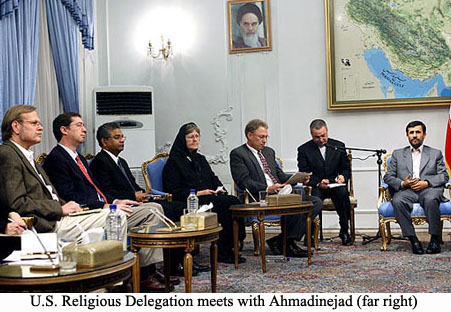As Christian leaders from the United States, we traveled to the Islamic Republic of Iran at this time of increased tension believing that it is possible to build bridges of understanding between our two countries. We believe military action is not the answer, and that God calls us to just and peaceful relationships within the global community.
We are a diverse group of Christian leaders from United Methodist, Episcopal, Catholic, Baptist, Evangelical, Quaker, and Mennonite traditions. The Mennonites have 17 years of on the ground experience in Iran. We were warmly welcomed by the Iranian people, and our time in Iran convinced us that religious leaders from both countries can help pave the way for mutual respect and peaceful relations between our nations.
During our visit we met with Muslim and Christian leaders, government officials, and other Iranian people.
Our final day included a meeting with former President Khatami and current President Ahmadinejad. The meeting with President Ahmadinejad was the first time an American delegation had met in Iran with an Iranian president since the Islamic revolution in 1979. The meeting lasted two-and-a-half hours and covered a range of topics, including the role of religion in transforming conflict, Iraq, nuclear proliferation, and the Israeli-Palestinian conflict.
What the delegation found most encouraging from the meeting with President Ahmadinejad was a clear declaration from him that Iran has no intention to acquire or use nuclear weapons, as well as a statement that the Israeli-Palestinian conflict can only be solved through political, not military means. He said, “I have no reservation about conducting talks with American officials if we see some goodwill.”
We believe it is possible for further dialogue and that there can be a new day in U.S.-Iranian relations. The Iranian government has already built a bridge toward the American people by inviting our delegation to come to Iran. We ask the U.S. government to welcome a similar delegation of Iranian religious leaders to the United States.
As additional steps in building bridges between our nations, we call upon both the U.S. and Iranian governments to:
- immediately engage in direct, face-to-face talks;
- cease using language that defines the other using “enemy” images; and
- promote more people-to-people exchanges including religious leaders, members of Parliament/Congress, and civil society.
As people of faith, we are committed to working toward these and other confidence building measures, which we hope will move our two nations from the precipice of war to a more just and peaceful relationship.
Members of the delegation:
J. Daryl Byler, Director, Mennonite Central Committee‘s Washington Office
Jeff Carr, Chief Operating Officer, Sojourners/Call to Renewal
Ron Flaming, Director of International Programs, Mennonite Central Committee
Edward Martin, Director of Mennonite Central Committee’s Central and Southern Asia Program
Jonathan Evans, Special Representative for Iran at the American Friends Service Committee (Quakers)
Mary Ellen McNish, General Secretary, American Friends Service Committee (Quakers)
Shanta Premawardhana, Associate General Secretary of the National Council of Churches USA for Interfaith Relations and Director of the NCC Interfaith Relations Commission
Maureen Shea, Director of Government Relations, The Episcopal Church
Patricia Shelly, Executive Board of Mennonite Church USA
Geraldine Sicola, Associate General Secretary for International Programs, American Friends Service Committee (Quakers)
David Robinson, Executive Director of Pax Christi USA
Joe Volk, Executive Secretary, Friends Committee on National Legislation (FCNL)
James Winkler, General Secretary of the General Board of Church & Society (GBCS), The United Methodist Church
This statement by the National Council of Churches’ delegation to Iran was published by NCC News Service on 26 February 2007.
|
| Print


